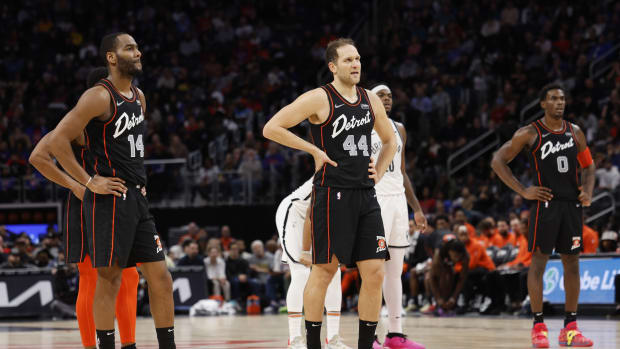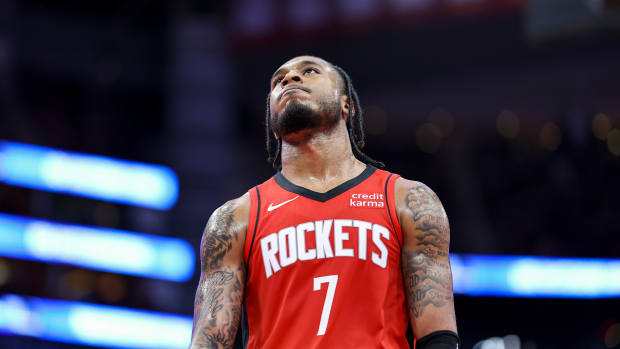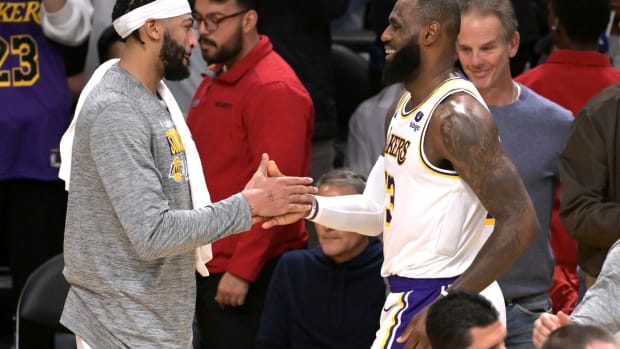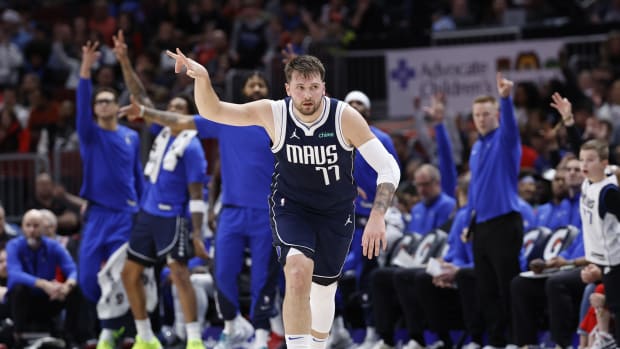Chris Bosh Is Ready to Close the Book on His Basketball Story
Chris Bosh has finally closed the book on his NBA career.
"I feel great. I'm happy. I'm healthy. And I'm ready to explore life outside of basketball,” Bosh said in front of a raucous Miami crowd on Tuesday, as his No. 1 jersey was retired by the Heat franchise he won two championships with.
Bosh’s career came to an abrupt halt in in 2016 after doctors diagnosed him with his second blood clot in as many seasons. Miami eventually released the sweet-shooting big man, and his comeback attempts ultimately didn’t materialize. Tuesday, Bosh was honored with his family, Pat Riley, Erik Spoelstra, and good friend Dwyane Wade joining him on the court as his No. 1 was raised to the rafters.
Bosh touched all the bases during his speech at the ceremony, which also served as a retirement announcement of sorts. He joked about beating Wade to the accomplishment, and grew emotional when discussing the importance of his family. He also thanked the fans who stuck with him during his medical scare, many of whom wrote him notes during his first medical scare in 2015.
"I read those letters. Those letters pushed me to get back on this court,” Bosh said Tuesday. “Those letters inspired me to get back up and walk across the room when I didn't think I had the energy to do it."
In a phone conversation with Sports Illustrated the week prior to the ceremony, Bosh discussed some of the biggest moments of his basketball life, the hatred of his Big Three teams, what’s been up to off the court, and more.
Rohan Nadkarni: I want to start with Game 7 of the 2012 East Finals. You went three-of-four from three, and after the game Doc Rivers said something to the effect of, ‘If Bosh is beating you from out there, you have to tip your cap.” How long had you been working on your threes?
Chris Bosh: It took about two years. I had been working on the three-point shot. I didn’t necessarily have the confidence because the league wasn’t there quite yet, right? But it was therefore pretty surprising. It just became knocking down the shots that were open and there for me. In that particular game, I was comfortable shooting them, but it was about the consistency. That was the issue at the time; I wasn’t taking a ton of those shots.
RN: I saw in a recent interview you said you wished you were more aggressive in the 2014 Finals. Is that something that maybe keeps you up at night? Does that stuff still bother you?
CB: No, not at all. It’s just for argument’s sake. As an athlete, someone who always wants to get better, you go back and look at the tape and you see the mistakes, what you could have done better. But that never keeps me up at night. Fortunately we were able to capitalize on championship situations more than once. It takes away that ‘What if?” for me.
RN: When you left the Raptors, you were the leader in most of their important statistical categories. Does it bother you that more people don’t remember how good you were in Toronto?
CB: Not at all. I kind of really like that era. I relate it to an artist making a mixtape in their basement, and you were kind of the only one that watching that. It wasn’t much recognition then, and we weren’t getting much exposure at the time. But that didn’t take away of how special it was. Maybe that was meant for the people of Toronto. Maybe that was just for us before everything got crazy and out of hand [Laughs.] But those are there if people ever want to do their research and put me in this place of being only a one dimensional player. I’ve had many layers to my career, and that one I was definitely more athletic, more fun, more dunks, more isos, more buckets [Laughs.]
RN: And more haircuts!
CB: Oh yeah, goofy videos. It was more of an adolescence at that time. When I got to Miami, class was over and it was time to get real.
RN: If you had to explain to people just how crazy it was in Miami, and how much people hated you guys that first year, what would you tell them?
CB: It would probably start when that parade happened. As cool as it may seem, I’m gonna tell people right now, and even for you right now man, if someone offers to throw you a parade? Think about it. [Laughs.] You have to think about it, man. For whatever reason, they thought we orchestrated this whole thing. They thought we put it together. We participated in it—and it was super cool and fun, I’m not going to lie—but, you know, I would show the clips of how much fun we were having and then show the outside reaction, the jerseys being burned. Even with the things that were happening to LeBron in Cleveland—that kind of incentivized some people in Toronto. I was like, ‘Bro, take it easy.’ But I would say just the sensationalism of everything. I would just play clips from the next day of everything happening outside of Miami. That would paint as good of a picture of anything.
RN: I was at that parade by the way, and it was awesome.
CB: Oh, of course. Looking back on it now, if someone said that wasn’t awesome, I’d be like, ‘Come on, bro. Stop. You don’t think that was cool?’ That hasn’t even happened again. Nobody ever did that. 30,000 people in the seats and we didn’t even have a basketball.
RN: That first year in Miami, do you think you let the hate get to you in the way you played?
CB: Absolutely. I think it was a surprise to everybody how it was handled, as far as the reactions were concerned. That was something we definitely had to get over. And we still had to be successful. And that was really, really hard to handle because it did change the way we played. It changed our thought process. You find yourself thinking about what you’re going to say to a fan who got out of line instead of doing what it takes to win. You’re worried about it being the Super Bowl every time it’s a regular season game, us not being allowed to settle in as a team. It was a very particular situation that we were faced with. Eventually we quieted our minds and came together. Basketball is basketball, we’ve being doing this our whole life.
RN: There are always stories about Dwyane ceding the control of the team to LeBron. Were you even consulted about that? Or was it just kind of an assumption that you would be the third guy?
CB: It was more of an assumption. I definitely wouldn’t say I knew what was going on all the time. I knew I wasn’t going to primarily have the ball in my hand. I knew I had to get in where I fit in. My role on the team was more so to figure things out. As many conversations that were had, I didn’t even really care about that. Everyone made a big deal about the hierarchy and everything, I never really paid much attention to it. It was never like, ‘Hey LeBron, this is your show!’ It was more like, this is what we need to do to win, these are the sets we are going to run, here’s the spacing of the floor, so on and so forth. It wasn’t this big, huge decision making process.
RN: You hit some pretty big shots during your career, even had that big block on Danny Green. Do you have moments that you remember that brought you the most joy when you were on the court?
CB: Man. Hmm, hmm, hmm, hmm. I would definitely say those crazy games without Bron and D, or without Bron. Those were usually the most memorable. One, because they were hard [Laughs.] And it was almost like a playoff game, the difficulty. And then trying to tweak the offense a little bit, especially when Bron wasn’t playing. When he was out, the whole team had to figure things out on the fly. But at the same time, it was really, really fun, because it was usually on the road, the crowd was still there, we still want to win games, sometimes our backs were against the wall. And the home team, the fans would be hyped up a little bit more because they thought they were going to beat us. Any time we got a chance to play in those games, we really relished those moments. And they ended up being really memorable regular season games, and that was some of the best basketball I played, because I had the chance to hit the big shot. You only get X amount times to do it, and you can count them on two hands at the most in your career.
RN: What have you been focusing on off the court these last few years?
CB: I’m able to focus on being a father, being a man in society, being a husband. Those things take a great amount of attention, and that’s what’s necessary to keep the legacy going. I have three boys and two girls, it’s extremely important that I guide them and show them how to be decent human beings. That’s what I’ve been happiest to give the most time to. And building on the future. There are so many other things outside the game, there are other worlds out there. And it’s a challenge for me to redefine myself. Can I be as great at something else as I was at basketball? I just have to find that and bring it out.
RN: What have you enjoyed the most since you stopped playing?
CB: I’ve actually enjoyed making music the most. I’m an aspiring record producer. I’ve made many friends, I’ve had a lot of conversations, I’ve had some great moments making music with people, learning about music. Putting records together, working with artists, that has brought me a lot of joy. And I’m glad that I’m in a place where I can really, really put myself into that and learn the craft. It’s been four years now. I’m getting better and more savvy in the space. I’m super happy that I have music. That was another thing, when I asked myself, what am I going to do? I had a guitar in my hand, and the next thing you know I was producing music.
RN: When did you find out you were getting your jersey retired? I have to imagine that means more to you than most people. What emotions do you think you’ll have that night?
CB: I found out a couple months ago. It was a conversation I had with Micky Arison and Pat Riley. I just wanted to show I was ready to move on from basketball. It’s hard to predict what my emotions will be. I’m super excited. I’m proud of the fact that ‘Bosh’ is going to be up there for a very long time. That’s what I’m most excited about, my family can look up there and see our name. I didn’t plan to be in this position right now, but it is what it is. I’m working with what I have, and I’m very happy to even be able to accomplish this without even knowing my time was that finite. It’s the closest feeling I’m going to get to playing in a game again. It will be a moment.
RN: Is it a little bittersweet for you watching this retirement tour for Dwyane Wade?
CB: Yeah, at times. But one of the things I always tell myself is not let that get in the way of anything. Even if I do feel bad sometimes, I’m still happy for Dwyane. It makes you realize how special this is. One of my friends getting to have this moment is all that matters, because I didn’t get to have it.
RN: Okay, I heard you talk about this on a Bill Simmons podcast, but I want to drill it down a little more. 2013 Heat vs. 2018 Warriors, who is on the court, and how are you guys matching up?
CB: I think we probably have me, D, Bron, probably Ray [Allen], and Shane [Battier.] That would be our five against their five. In crunch time, that’s probably what you would have seen. We weren’t going to switch everything. And if they switch everything, we’re probably going to work in the post vs. LeBron until they make a decision not to switch, and then we work from there. I think we really try to get after Curry, and try to run him off the threes. You can never really say who’s going to win, but it would be a hell of a series, I could tell you that.





































